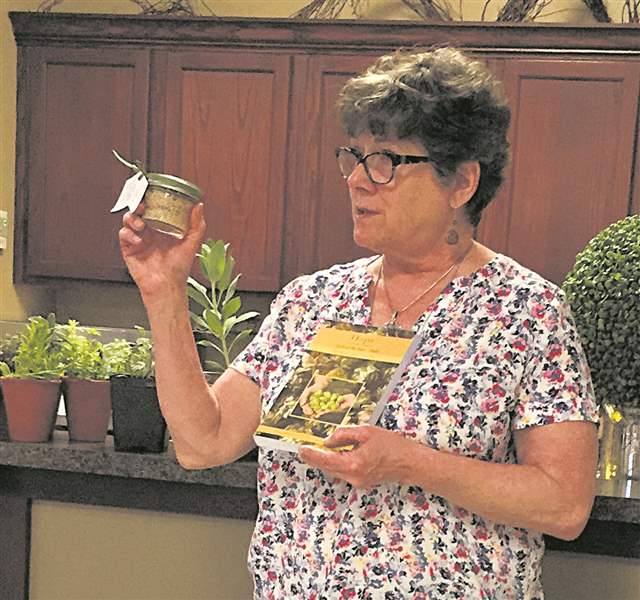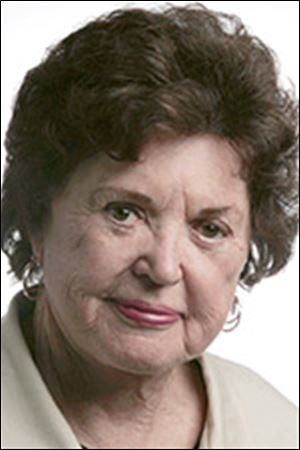
Sage advice from an herb expert
5/20/2018
Susan Betz's topic at Adrian College was 'Thymely Tips and Sage Advice.'
THE BLADE/MARY ALICE POWELL
Buy This Image
After her recent lecture on the values and pleasure of growing herbs, Susan Betz invited the audience to take home samples from an array from her personal harvest.
It would be interesting to learn how the Adrian College guests used Susan’s dried herbs. According to her informative lecture, there is not only a preponderance of herb varieties to grow but endless ways to utilize them. Sprinkling favorite herbs on salads is old hat, but Susan also reminded her audience to consider flavoring tea, vinegars, butter, and oils with herbs and added they can be beneficial and save money for medicinal use and in lotions and other body products.

Susan Betz's topic at Adrian College was 'Thymely Tips and Sage Advice.'
The take home herbs included anise seed, calendula flowers, german chamomile flowers, elder flowers, hibiscus flowers, lemon balm leaf, lemongrass, nettle leaf, peppermint leaf, rosehips, rosemary leaf, and thyme leaf.
Susan’s “Timely Tips and Sage Advice” program was sponsored by Beth Docking, wife of Dr. Jeff Docking, Adrian College president. It is customary for Mrs. Docking to plan a program for the trustees’ spouses during the annual board of trustees meeting.
The array of dried herbs that guests enthusiastically spooned from pint jars into small bags as souvenirs was but one of Susan’s ways to share her longtime passion, which began as a hobby 35 years ago but has escalated into national recognition, a new book, and a spring/summer calendar packed with speaking engagements.
The Jonesville, Mich., conservationist and educator did more than talk about her years of experience growing, using, and writing about a multitude of herbs. Her information was supported by a large slide screen featuring photographs of her herb gardens that are beautifully landscaped and cover much of the 155 acres where she and her husband John have lived for 16 years.
Does she give tours of her gardens?
She does, occasionally, by appointment, but unfortunately her speaking engagement in the tri-state area and her national involvement in herb societies keep her too busy to crowd in public tours. But she recommends the Southern Exposure Herb Farm near Battle Creek, Mich.
Neighboring with Nature is a perfect title for her reference book, which describes in detail and graphically numerous herbs and their care. Susan has an impressive affinity for Mother Nature and asks her audience to be aware of nature’s wisdom when gardening.

Powell
In her book, she writes, “Schools and educational tools change according to the times, but nature’s teaching system never goes out of style. Some lessons are best learned directly from the land itself.
“A sustainable world surrounds us, and Mother Nature is ready and willing to show us how to do things her way.”
Pollinating gardens, designed to provide much-needed nectar forage for bees, is a new trend, according to Susan, that addresses nature’s needs. She compared the pollinating gardens to the victory gardens in 1944, when America did a “great job.”
She looks at the land around us as a library and encourages new gardeners to read their land according to how the soil and the plants are expected to perform.
Susan gives nature a high score for the ability to multitask, but she also says she has never discovered a maintenance-free garden.
Susan refers to one group of herbs as volunteers, the species that self sow. They are dill, coriander, parsley, chervil, salad burnet, summer savory, fennel, and calendula.
When choosing them, her advice is to allow one plant to make seed and when the seed is ripe shake it into an area of the garden that will not be disturbed.
It is best to harvest herbs in the morning after the dew has dried but before it is too hot. She says gardeners should only pick the healthy leaves and not be afraid to discard damaged leaves and flowers on the plants.
There is little doubt that fresh herbs are the best, but there are some rules for drying the herbs to use in other ways. No matter how the harvested herbs will be preserved, it is mandatory that they are completely dry.
After they are patted dry with a towel, the herbs should be air dried. Susan says a screen works well for the air drying.
Some herb gardeners prefer to freeze the dried herbs, according to Susan. The easiest way is to spread the dried herbs on a baking sheet and freeze overnight. Then pack the frozen herbs in small containers. Or the dried herbs can be added to broth or water and frozen in ice cube trays. Store the frozen cubes in baggies to use in soups and stocks.
While Susan’s lecture was an inspiration to start digging and planting a garden of herbs, there is one quote in her book that bears consideration. It is credited to L.H. Bailey, who said, “One plant in a tin can may be a more helpful and inspiring garden to some mind than a whole acre of lawn and flowers may be to another. It depends on the temperament of the person.”
Neighboring with Nature is available through Amazon and is sold at Barnes and Noble. Requests for Susan’s speaking engagements are made through her web site, www.freshstartherbs.org.
Mary Alice Powell is a retired Blade food editor. Contact her at poseypowell@aol.com.